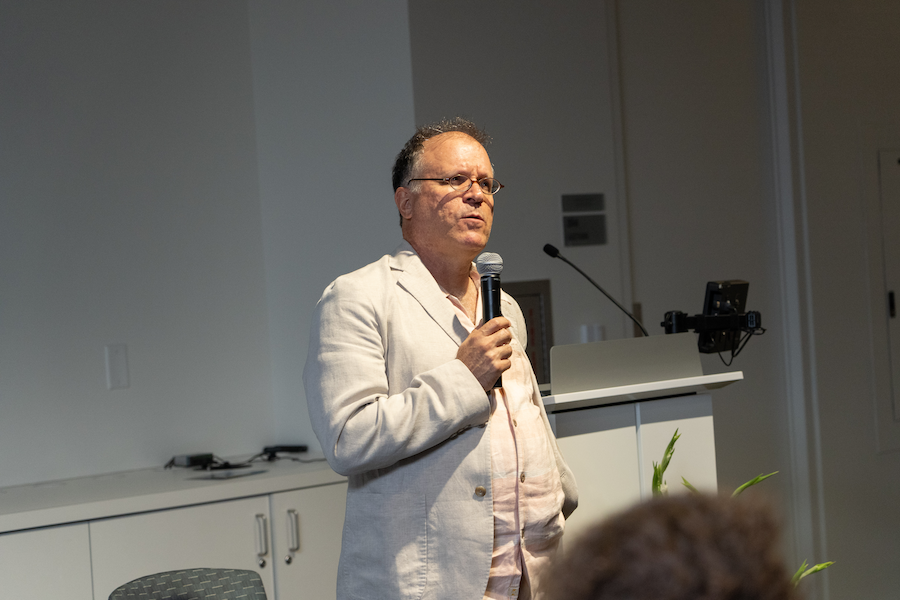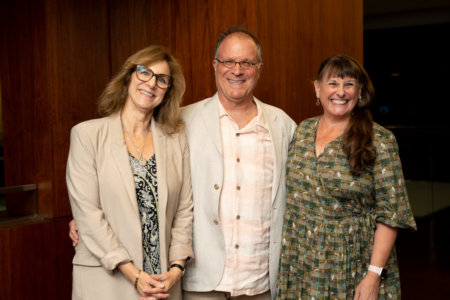
By Tarami Awosile ’27
An enthusiastic audience gathered in the William H. Hannon Library on Oct. 3, 2023, to hear IIan Stavans, an internationally known, award-winning critic, linguist, and public speaker, take his audience through a historical and linguistic tour, grounding his exploration of divine and human love in the Torah and the New Testament.
Stavans, a professor of Humanities, Latin American and Latino Culture at Amherst College, delivered the prestigious Fischmann Family lecture, which has been hosted annually since 2013 and is always a meaningful event, such as this year’s theme of love in these fraught times.
Stavans referred to the languages of several European cultures to explore the meaning of love. He said the Oxford English Dictionary defines love as an intense feeling of deep affection; the Dictionary of the French Academy defines love as the movement of the soul that pushes to establish an intimate relationship with a being, either to do him good or to receive it from him; an authoritative German dictionary defines love as expressions of empathy towards the country or community. There is no universally accepted definition of love, Stavans said, adding that every culture has a different understanding of love and expresses it differently. Language, therefore, allows us to experience the world in different ways. “How much of love is universal, individual, cultural?” Stavans asked.
When asked about her understanding of love at this point in history, where antisemitism is once again on the rise, the moderator, Holli Levitsky, professor of English and director of Jewish Studies, replied,“We must continue to love; the Jewish people seek peace as well as justice.”

Stavans also explored other depictions of love, including violence that sometimes accompanies it, i.e., Romeo and Juliet, Antony and Cleopatra, and Francesco Petrarca’s concept of love. Romeo and Juliet give us insight into love with a deep fire, “a magnetic force of love that brings them together,” and the magnitude of the love that brought them to death. Because we are exposed to this story at a young age, it influences how we want to experience love, “If we hadn’t learned about Romeo and Juliet, would we feel the same expansiveness?” Stavans asked.
As a writer, Stavans noted that the Bible contains descriptions of people (and things), but we never have access to their thoughts, so we don’t know the true motives of their actions. Are they doing what they do out of love or out of fear? However, Jesus is used as a paradigm for love in the Gospels. “We are assigned to ‘love thy neighbor,’” Stavans said, “but how can we truly love someone we hate? Could this be an unrealistic task that is impossible to complete?” Levitsky elaborated on the current moment: “Antisemitism – the hatred of a Jewish person, people, or peoplehood, just for being Jewish – is the oldest hatred in the world. It’s been said that ‘the antidote to hate is love.’ If every antisemite replaced their hatred with love, we would have a beautiful world indeed – with no antisemitism, racism, or other hatred.”
Stavans talked about his lack of comprehension of people with such a strong love for their country that they would die for it. He could never see himself doing that, and he said that may be because he is an immigrant or minority. He was born in Mexico.
To conclude, Stavans confessed his lack of knowledge about love even though he has dedicated his whole life to figuring out its true meaning. “We are not given a clear sense of the meaning of love,” he said. “But, this means that we have to go out and experience the person in front of us and learn.”



